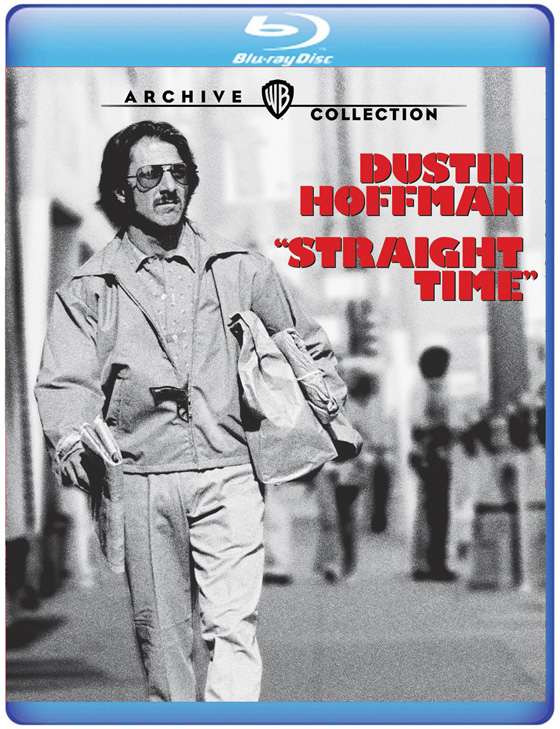
Catch me on the right day and I’ll proclaim Straight Time (dir. Ulu Grosbard) the best film of 1978.
Based on Eddie Bunker’s novel, No Beast So Fierce (Bunker also co-wrote the script), the movie is a character study about Max Dembo (Dustin Hoffman), a longtime ex-con who can’t go straight—who can’t assimilate to life outside prison. Wound more than a bit tight, Dembo tries to do right by his greasy parole officer, Earl (M. Emmet Walsh). For a short while, he does. He lands a job at a canning factory, and checks in with The Man as needed. But Dembo finds that freedom is a slow, degrading series of humiliations—death, if you will, by a thousand paper cuts—like when a friend’s wife (Kathy Bates) tells him he should leave them alone. Or when Earl sends him back to jail after someone else shoots up in Dembo’s room at a halfway house.
That last causes Dembo to snap. In no time at all, he’s plotting robberies, enlisting the help of an old friend (Harry Dean Stanton) who pines for action. To disclose more would be sacrilege. Suffice it to say, things fall apart quickly.
Hoffman is superb. His performance feels lived-in, not showy. Dembo is a twitchy piece of work, a smart man with poor impulse control. Hoffman sells us on the search for normalcy, on how ‘normal’ goes against the core of Dembo’s personality. Straight Time makes you root for him. He’s a sad guy, a dangerous one; but as repellent as he is, we like him.
I find it hard to dock the movie. If anything detracts, it’s the budding romance Dembo has with an employment counselor (Theresa Russell, in her first starring role). Their union is a tad unbelievable. Still, Russell holds her own. As a sunny but guarded naïf, drawn to Dembo like a moth to a flame, she conveys flickers of sadness, of rage, just below the surface. A film such as this, peppered with shifty male egos, could have relegated her character (her expressiveness) to the sidelines. That Straight Time makes her an integral part of the story—its heart even—is to its credit.
And this approach extends to the entire film. It delivers plenty of taut action, but it’s piqued by the relationships between the characters, the way they interact. Some moments stretch credulity. Perhaps the movie isn’t dark enough. Perhaps Dembo’s inevitable return to crime could have used an even slower buildup. Maybe the movie spares him from looking like the two-bit hood he doesn’t want to be yet is. Had we seen him struggle more and succeed—had he started ‘winning’ at the life he thought he craved—his downfall would be more tragic. He’d have more to lose. I’m not sure, however, Grosbard and co. see the ‘real Max’ as a sad trap. It’s just who he is. This matter-of-fact presentation—this willingness to inspect how he operates and why, without casting judgment—doesn’t make the film any less engaging. From a dramatic standpoint, this more observational style poses (arguably) a missed opportunity. But the major point stands. You can’t reform Dembo. He’s too far gone; he never had a chance.
Be warned, though: Straight Time is not a visceral, pulse-pounding thrill-ride, with intricate, epic heists, operatic gun battles, and fancy camera movements galore. It’s a modest, pseudo-authentic portrayal of a small-time crook. Owen Roizman’s cinematography goes for grit, but it’s never stylized. The L.A. light is just like I remember from when I used to live there. Smoggy and brittle—not a twilight-soaked city of the beautiful and damned. But more than any other element, the acting makes the movie tick.
As Dembo’s junkie friend, Gary Busey is just right, the same for Walsh’s detestable shitheel of a parole officer. Stanton, though, as a cautious, charismatic live wire stuck in a staid suburban life, almost steals the film. It’s not a big part; but pound for pound, line for line, he conveys the same adrenaline-fueled restlessness Hoffman does, and it feels true.
But Hoffman is the movie. He bought the rights to the Bunker book and oversaw the casting. When the effort to act and direct proved too much for Hoffman to handle, Grosbard (a friend) took over directing duties. Promised (then denied) final cut, Hoffman gives what may be his best performance. This is a passion project. In ‘78, though, the public at large didn’t care for it. That could explain (in part) why he hasn’t done more to tout the film. No matter. He should be proud. Straight Time is a classic.
Beyond audio commentary by Hoffman and Grosbard, the Warner Archive Collection Blu-ray sports the original trailer and a vintage featurette.